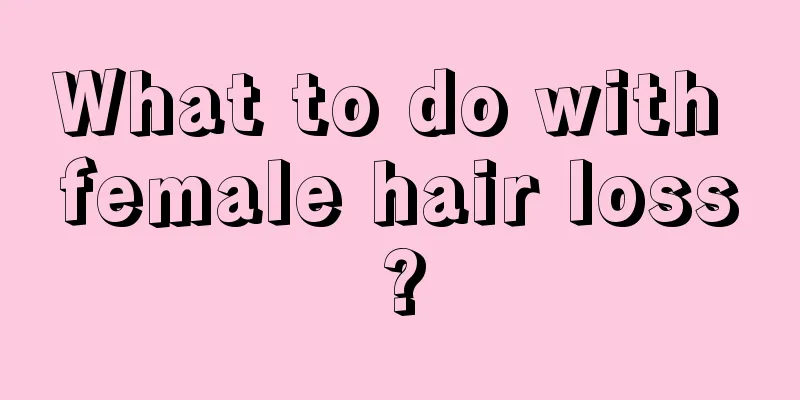What to do with female hair loss?

|
Women often find themselves losing their hair. When they wash or comb their hair, they often see a lot of hair on the ground. Women who love their hair will feel heartbroken. Hair loss in women is often related to endocrine, scalp, medication and other factors. When you find yourself losing a lot of hair, you must take hair treatment measures to prevent more serious hair loss, which will then cause the patient to have less hair and affect their appearance. So let's take a look at what women should do about hair loss? When women experience hair loss, it is important to find out the cause of the disease and take treatment accordingly. Treatments for female hair loss: 1. Seborrheic alopecia: Seborrheic alopecia is called the "cancer" of hair loss. Its treatment is a global problem. An important reason for this situation is that there is currently no most direct and effective treatment drug. Currently, Western medicine advocates the use of 5α-reductase inhibitors to treat male seborrheic alopecia, because male hair loss is related to the concentration of dihydrotestosterone in the body. Studies have shown that seborrheic alopecia in women is associated with increased scalp testosterone levels, but not with increased dihydrotestosterone levels. This suggests that seborrheic alopecia in women should be treated mainly with anti-androgen drugs. Solution: Wash your hair frequently, control oiliness, and take medication. 2. Pathological hair loss: mainly due to viruses, bacteria, and high fever that damage hair matrix cells, inhibiting the normal division of hair matrix cells, and putting hair follicles in a state of shock, leading to hair loss, such as acute infectious diseases, long-term use of certain medications, etc. Solution: Get more rest and your hair will grow back after you recover or stop taking the medicine. 3. Chemical hair loss: Harmful chemicals damage scalp tissue and hair follicle cells, leading to hair loss. Solution: Do not use highly irritating hair dyes, perm agents and inferior shampoos. 4. Physical hair loss: Hair loss caused by air pollutants clogging hair follicles, harmful radiation, etc. Solution: Do not use nylon combs and nylon head brushes that are prone to static electricity. Wear a protective cap and wash your hair in an environment with serious air dust pollution. 5. Nutritional alopecia: Digestive and absorption dysfunction causes malnutrition and leads to hair loss. Solution: Improve nutrition and eat more fruits and vegetables, kelp, mulberries and walnut kernels. 6. Obesity-induced hair loss: A large amount of saturated fatty acids produce waste after metabolism in the body, which clogs the hair follicles and causes hair loss. Solution: Eat less greasy and heavy food and increase physical exercise. After we understand the content of the article, we can answer the question of what to do if women are suffering from hair loss. General hair loss is a normal phenomenon, but severe hair loss is a disease. Patients must find the cause of the disease in order to carry out relevant treatment accordingly. Women should not dye or perm their hair in daily life, as it will aggravate the condition and make hair loss more serious. |
<<: Does pregnancy cause stomach pain?
>>: Why does a woman's lower body smell?
Recommend
What is the reason for multiple cysts in the ovary?
I believe that ovaries are not unfamiliar to many...
When is the best time to have an abortion?
Some female friends will have an abortion because...
Do myopia require glasses? 8 hard-core knowledge that parents are advised to keep in mind!
Zhou Chao, director of the Optometry Center of Ai...
Is it still worth feeding lobsters with red shells in September? What is the matter with lobsters with red shells?
In September, the water temperature drops. When t...
How to tell if you have enough milk?
In our lives, many mothers are particularly worri...
What should I do if my breasts are swollen and I can’t suck them out?
Women who are breastfeeding often encounter some ...
Why should I advise you to really stop “bearing the pain”?
Whether it is a cold, fever, sprain or gum inflam...
Pictures of normal nipples
Before puberty, girls' nipples will protrude ...
In addition to the football breastfeeding position, you also need to know these
Breastfeeding plays a key role in the growth of n...
What to do if your breasts swell and hurt 10 days before your period
Some women will experience bloating and pain befo...
Is ovarian cyst a big problem for pregnant women?
If a woman is not pregnant, then having ovarian c...
Sharp Women's Early Pictures
In clinical medicine, there is no such disease as...
Are uterine fibroids related to sex?
Uterine fibroids are a common uterine disease and...
The benefits of semen for women's health
1. It promotes endocrine and metabolism. Sexual l...









